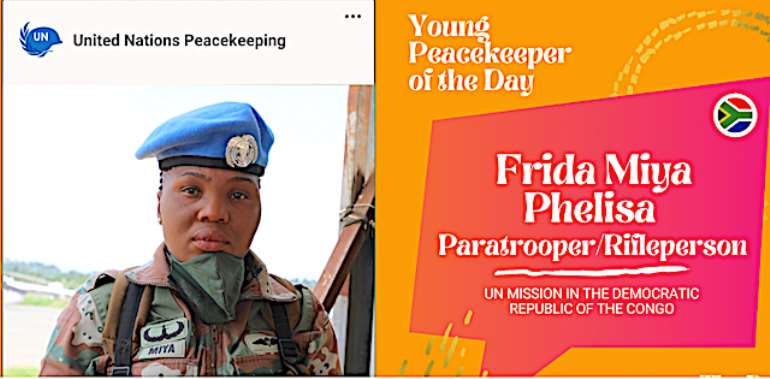‘I Like My Work As A Paratrooper’

Phelisa Frida Miya, 28, a paratrooper/riflewoman from South Africa serving in the UN Peacekeeping Mission in the Democratic Republic of the Congo (MONUSCO)
One of the few female soldiers in a male-dominated field, she believes her unique position can inspire others.
How does it feel to be a female paratrooper in a peacekeeping mission in the DR Congo?
If I may say, as a first female paratrooper who is really on the front line and is for the first time in the FIB [Force Intervention Brigade], it feels so good because all this experience is giving me the opportunity to try and bring into action everything that I've been trained on. It gives me that commitment to make sure that I maintain the skills and I enjoy each and everything that we go through here.
What is it like being a paratrooper?
I can say sometimes it is easy. Sometimes it is not easy. My male counterparts try to make it easy for me to work with them, but the difficult part of it is that, in a well-known male-dominated field, each and every time and in every task, I have to push harder than everyone else in the company as a female paratrooper. So, in each and every activity that we take part in, either in night patrols, day patrols or interacting with the local community, I have to give my all, especially focusing on the women and girls of the DR Congo, and just to encourage them and to show them that females can also make it in a male-dominated field.
When you come across the local population, how is their reaction to you after finding out that you are a female paratrooper?
It has been overwhelming because they do welcome me and they feel safest when they see a female in uniform because, as women, we’ve got our own way of how to approach the local community and win their hearts and minds. It becomes easier for us to interact with them. It is also easy for me to gather information from the locals because mostly they come to me.
How do you feel about yourself when you have that reaction from the local population?
It is a very good experience to be welcomed by the local population because it makes my job easier as a female. And in that, it is making it easier for me to uphold the UN mandate to protect civilians.
You've been there for just six months. If you were to think about the proudest moment of your stay in the DR Congo, what would that be?
My proudest moment yet in the DR Congo is that I've been given the opportunity to work in the most male-dominated company. In a company that is the reaction force, where we have to react at any given time in a very dangerous situation. This encourages me and other females to believe that all is possible. You know, that is my proudest moment up to so far.
For more information on COVID-19, visit www.un.org/coronavirus
